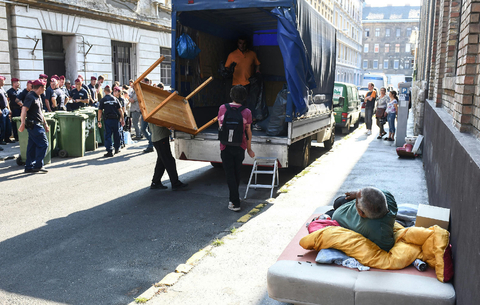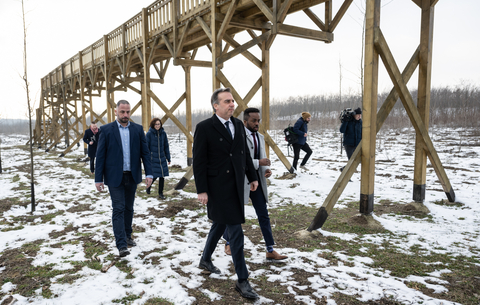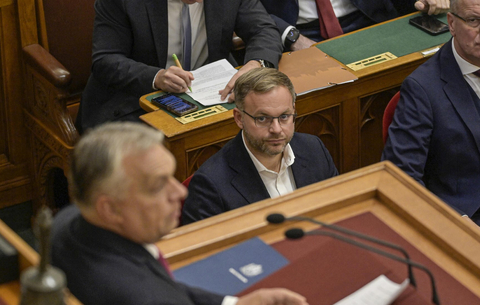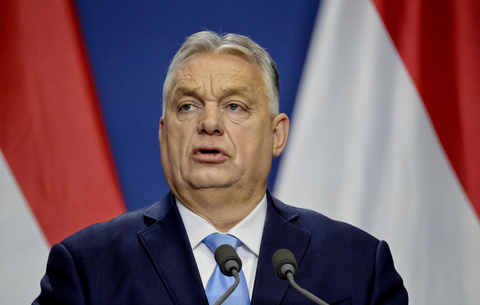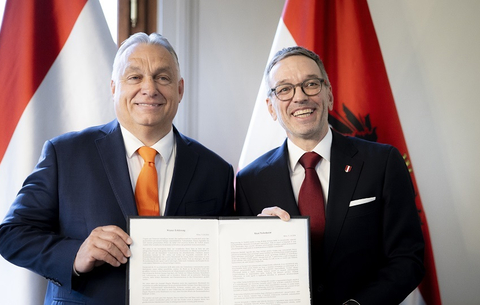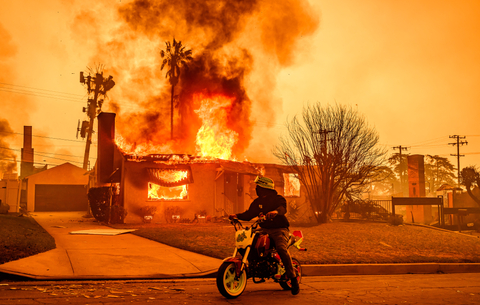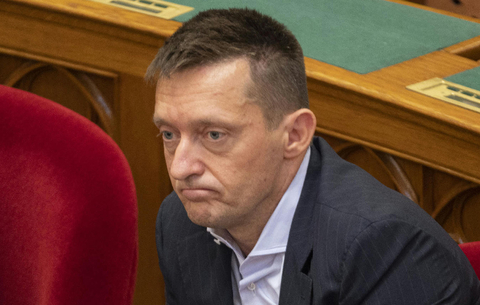Alone or in coalition
Separately or together - this question has defined the relationship between the Hungarian Democratic Forum (MDF) and Fidesz over the past four years. Fidesz tried to create a unified right-wing, going as far as to entice politicians away from MDF. But Ibolya David's party was convinced that it could only survive if it remained independent.
Tensions between the MDF and Fidesz began the evening after their coalition lost the second round of the 2002 elections. Zoltan Pokorni said that if Fidesz and the MDF formed a single party group in parliament and managed to get a recount, then there was a chance of Ferenc Madl, the then president, asking them to form a government.
Ibolya David dashed those hopes that evening, saying her party would form an independent party group.
Over the following months, Fidesz called for the formation of a unified right-wing party. But Ibolya David repeatedly rejected overtures from Fidesz, going back on the two parties' electoral agreement, in which they had agreed to form a party alliance consisting of two closely cooperating, but independent parties.
In June 2002, Csaba Hende, once a confidant of David Ibolya's, unexpectedly resigned as deputy-president of MDF, agreeing to organise the activities of the Polgari Korok (Civic Circles) movement. A few days later, he resigned both as member and president of the parliamentary employment committee. One year later, Csaba Hende was excluded from the MDF parliamentary group. He later left the party altogether.
Before the local government election, Fidesz and the MDF were still able to agree to work together. Then, respondents to a poll on the MDF's website voted decisively in favour of independence. By autumn, the parties' politicians were disagreeing on a wide range of issues.
At the end of September, Fidesz stayed away from a celebration of the MDF's 15th birthday. After the local government elections, Kalman Katona's decision to join the MDF's group in parliament instead of Fidesz's caused further tensions.
In November, Istvan Balsai resigned from his position as leader of the MDF group. Balsai was said to have had several confrontations with Ibolya David, who was not satisfied that Balsai was representing the MDF's position with sufficient clarity at negotiations with Fidesz. In April 2005, Balsai left to join the Fidesz group. Karoly Herenyi followed him as leader of the MDF benches, hanging on in that position despite repeated attempts by Sandor Lezsak to get rid of him.
The presidents of Fidesz and the MDF, Viktor Orban and Ibolya David, did not meet following their electoral defeat until summer 2003. Orban wanted close cooperation, but Ibolya David wanted the two parties to form separate oppositions. MDF rejected a Fidesz proposal to make it possible to be a member of two parties.
In that year, a letter sent by the former prime minister Peter Boross to the editor of the conservative daily Magyar Nemzet caused a minor scandal. In the letter, he asked the paper to leave the MDF alone and not undermine its electoral chances with bad press.
For a while it was thought that Sandor Lezsak, an advocate of closer cooperation with Fidesz, might stand against Ibolya David for the party leadership, but in the end David was the only candidate. She then announced that the MDF would stand independently in the European Parliament elections, even though Zoltan Pokorni, speaking at the same party conference, called for closer cooperation. The MDF managed to get one member into the European Parliament.
In March, a new scandal deepened the rift between the two parties.
Fidesz refused to nominate a candidate to serve on the state broadcaster's board of governors, allowing the MDF to fill both slots allocated to the opposition. Increasingly, Fidesz politicians accused the MDF of working with the government coalition.
In September, Ibolya David's internal party opposition, the Lakitelek Group, tried to seize the party reins, moving a motion of no confidence in Karoly Herenyi. Though they succeeded, Herenyi claimed they had violated party procedure, and he excluded five of the MPs from the MDF benches. The matter came before the parliamentary affairs committee, where the government majority ruled in favour of Herenyi.
The MDF group shrank from 22 MPs to 17. The party's national executive ordered the remaining Lakitelek Group MPs to sign a declaration of loyalty.
The national executive meeting decided at its October meeting that the party would run independently in the 2006 elections. The committee passed a motion of no confidence in Sandor Lezsak and Laszlo Balogh, ordering them to leave the party and its parliamentary group within three days. They refused to do this, and after a long civil war, Karoly Herenyi excluded them from the group. Seven group members followed them out of solidarity, bringing the number of MDF MPs down to eight.
In November, Ibolya David sent an open letter to Viktor Orban, calling on him to refrain from interfering in her party's internal affairs.
The next clash came in June 2005. In the first round of the parliament's presidential vote, several right-wing MPs voted for Katalin Szili, the coalition's presidential candidate, and against Laszlo Solyom, Fidesz's and the MDF's candidate. Janos Ader said: "We wanted to smoke the rabbit out of its lair, but instead of rabbits, moles came out."
A few weeks later, several former MDF MPs joined the Fidesz parliamentary group.
Since then, the MDF has several times stated that it will not form a coalition with any party. At the beginning of the campaign, Ibolya David repeated this. There were confrontations between the two parties during the campaign, with MDF candidates claiming that Fidesz candidates had tried to bribe or blackmail them into standing down.
The Fidesz candidate Zoltan Bago tried to threaten and bribe the MDF candidate Imre Romsics into taking the "correct" decision. Orban later apologised to Ibolya David over the affair.
At the end of March, Ibolya David said she would only enter a coalition with Fidesz if she became prime minister.
